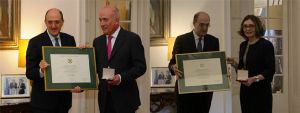Medinet
 MediNet is a network that focuses on the development of tools to be used for medical applications and specifically on radiation therapy. Main emphasis is put on applications for ion-beam therapy. Two distinct and complementary pillars are forming MediNet under the common topical umbrella: Research on detector instrumentation for radiation therapy (Task 1) and development of nuclear tools for the radiation quality characterization in ion-beam therapy (Task 2).
MediNet is a network that focuses on the development of tools to be used for medical applications and specifically on radiation therapy. Main emphasis is put on applications for ion-beam therapy. Two distinct and complementary pillars are forming MediNet under the common topical umbrella: Research on detector instrumentation for radiation therapy (Task 1) and development of nuclear tools for the radiation quality characterization in ion-beam therapy (Task 2).
What is MediNet
MediNet is structured as a Networking Activity within the EU-funded (H2020) ENSAR-2, the programme that integrates the activities for European nuclear scientists who are performing research in three of these major subfields: Nuclear Structure, Nuclear Reactions and Applications of Nuclear Science. ENSAR-2 has received funding from the European Union’s Horizon 2020 research and innovation programme under grant agreement No 654002
MediNet Mission:Cancer ranges amongst the most severe challenges to modern society, rendering the development of effective tumour treatment of highest societal significance. Nuclear-Physics-related knowledge, technology and expertise are highly relevant to improve tumour diagnostics as well as therapy, thus contributing importantly to the advancement of public healthcare. Particle therapy has undergone major technological developments in the last two decades and has been shown to be effective especially for the treatment of tumours in the vicinity of sensitive organs at risk. The increasing importance of particle therapy manifests itself in the increasing number of proton and carbon ion therapy facilities worldwide, e.g. more than ten facilities are operational in Europe, while a similar number is under construction or in the planning stage. Noteworthy in this context is the interest expressed by the US Department of Energy (DOE) and the National Cancer Institute (NCI) to learn from the experience and perspectives of modern particle therapy technologies in Europe . At the same time, also the more widespread forms of radiotherapy, such as those based on intensity modulated photon beams (IMRT), are continuously being optimized. The optimization of radiation therapy in general and particle therapy in particular requires research on a variety of topics such as beam delivery optimization, in-vivo monitoring of the delivered dose, dosimetry, radiobiology and radiation quality. Expertise in nuclear techniques for the detection and characterization of charged particles and photons is crucial to each of these objectives. Large efforts are therefore devoted to the development of innovative detector technologies and modelling in several European research groups, focusing on both clinical and pre-clinical applications of particle therapy. Under the common topical umbrella of nuclear tools applied to the medical environment, two distinct but complementary pillars (Task1 and Task 2) are jointly pursued within the MediNet NA:
'  e Detector Instrumentation for Radiation Therapy'
e Detector Instrumentation for Radiation Therapy'
LMU Munich / Germany, IPN Lyon / France, LPC Clermont-Ferrand / France, LPSC Grenoble / France, GSI Darmstadt / Germany, IFIC Valencia / Spain, JLU Giessen / Germany, KVI-CART Groningen / Netherlands, LIP/ U Coimbra /Portugal, NCNR Warsaw / Poland, TU Delft / Netherlands, OncoRay & TU Dresden / Germany, U Complutense Madrid / Spain, INFN – U Pisa / Italy, INFN – U “La Sapienza” Rome / Italy.
Task 1 comprises research on beam-delivery methods, large-area transmission detectors, non-destructive beam intensity measurements, improved imaging technology (proton and ion radiography and tomography, in-situ PET systems, prompt-gamma imaging detectors, vertex imaging), and reliable online dosimetry. It is noted that several of these activities are expected to contribute to the development of novel instrumentation for IMRT as well. The groups participating in this task carry world-renowned expertise and cutting-edge technologies in the pertinent research fields, including a strong connection to operating or planned particle therapy facilities for the clinical translation of the pursued developments. Universidad de Sevilla, Spain,has joined MediNet Task 1 as a non-beneficiary, associated member.
Contact for Task 1: Peter G. Thirolf, LMU Munich, phone: +49 89 289 14064, email Peter.Thirolf@lmu.de
'  Nuclear Tools for Ion Beam Therapy: focus on Radiation Quality'
Nuclear Tools for Ion Beam Therapy: focus on Radiation Quality'
Warsaw University (Poland); VINS Belgrade University (Serbia); NuPECC; LPC Clermont-Ferrand (France); INFN-LNS-Catania (Italy); INFN-LNL-Legnaro (Italy); IFJ Krakow (Poland); GSI Darmstadt (Germany); ENLIGHT; EBG MedAustron (Austria); Basel University, (Switzerland).
Task 2 focuses on software and hardware tools from nuclear physics for the assessment of the radiation quality in ion-beam therapy. The approach is multidisciplinary to study from one side the physical parameters of the radiation and on the other side the correlations to the biological effects. Working groups are formed for studies on Monte Carlo modelling of physical and biological parameters, studies for biological dosimetry, microdosimeters based on proportional counters and solid-state detectors, and biological and imaging compatibility of detectors for in vivo applications.
During the kickoff meeting, it was decided that the participation to the network activities and working groups is open to external specialists and scientists, also from institutes external to the Ensar2 consortium. The researchers, who will actively contribute to the progresses, will be fully integrated in the network, but will not have access to the funds provided to the MediNet Task2 network, in the framework of the ENSAR2 project. Seven research groups joined MediNet Task 2 as non-beneficiary members since the beginning of the Network activities: Austrian Institute of Technology, Vienna, Austria; Centre d'Etudes Nucleaires de Bordeaux-Gradignan, France; SCK•CEN Belgian Nuclear Research Centre, Boeretang, Belgium; Universidad Complutense, Madrid, Spain; Universidad de Santiago, Spain; Universidad de Sevilla, Spain; Universiteit Hasselt - Campus Diepenbeek, Belgium.
MediNet Task2 organized a Discussion Seminar on "Challenges and prospective of the assessment of radiation quality in ion-beam therapy", Legnaro, Padova, Laboratories of Istituto Nazionale di Fisica Nucleare, 30-31 January, 2017 More info
Contact for Task 2: Giulio Magrin, EBG MedAustron, phone:+43 2622 26 100 611, mobile: +43 664 73 460 479, email: giulio.magrin@medaustron.at
MediNet News
MediNet News: Knighthood of International Collaborations, 2 June, 2019
Ivan Petrovic and Alaksandra Ristic Fira were honored with the decoration of 'Cavaliere dell’Ordine della Stella d’Italia' (Knights of the Italian Star). The decoration was awarded for their merits gained during more than twenty years of activity in the field of scientific research, promotion of links, and collaboration and friendly relations with the Italian academic and scientific community. The activities of Ivan and Aleksandra within MediNet and ENSAR 2, in particular in collaboration with the INFN Laboratori del Sud in Catania, are part of their prolific contributions to the Italian scientific community. 'We are very honored and happy' said Aleksandra and Ivan after receiving the Italian star.
MediNet News: MediNet on Twitter, 2 April, 2018
Account:@MediNet_ENSAR2
Hashtag:#MediNet.
The purpose of this account is to advertise events as MediNet meetings and related training opportunities; advertise PhD, postdoc and fellowship positions; promote MediNet activities and collaborations, and increase the visibility of MediNet members publicising posters and presentations of young and experienced researchers during local and international conferences.
MediNet News: Database of Phantoms, 31 March, 2018
Standardization of baseline phantoms: Following the MediNet Task 1 discussion on standardizing phantoms and availability of phantoms, an action was proposed to collect a database of the phantoms available within the network institutions. More detailed in the Task_1 web page.
Getting started
- Network's Meetings and activities
*Kickoff Meeting, 2016
*Midterm Meeting, 2018
*Final Meeting, 2019 - Dissemination and events
- Partner Institutions
*Task 1, restricted access
*Task 2, restricted access - Network documents
- Ensar2


